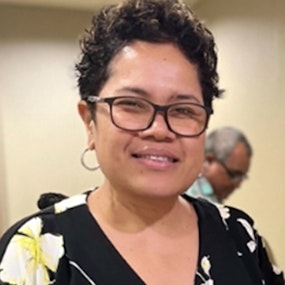ROBERT JOHNSON:
This is the award-winning Public Health Review Morning Edition for Thursday, February 8, 2024. I'm Robert Johnson. Now, today's news from the Association of State and Territorial Health Officials.
MOLLY DICKENS:
The current state of childcare across the U.S. hits a range of stressors that we know to impact health.
JOHNSON:
Dr. Molly Dickens is a physiologist who studies stress. She's also the founder of the Maternal Stress Project. Dickens says maternal health is impacted by stress linked to childcare. One concern is the rising cost of that care.
DICKENS:
Another key psychological stressor that affects health is unpredictability. And with increases in childcare center closures alongside care providers that are scaling back on hours or offerings, parents end up putting together a patchwork of care that inevitably has multiple points of failure.
JOHNSON:
Dickens notes there's research that connects Childcare stability to maternal health.
DICKENS:
Parents' health affects child health, child health affects parents' health, parents' stress load affects parents' health, parents' stress load affects child's stress load, which affects their health.
JOHNSON:
That's why Dickens wants public health leaders to advocate for policies and funding that can stabilize childcare in their jurisdictions.
DICKENS:
The treatment is also prevention. Stabilizing childcare is an opportunity to improve health and decrease health risk across the community. And health officials need to see their role in that fight for childcare funding because that funding is what is going to ensure parents have access to affordable, quality, stable childcare options in their area.
JOHNSON:
Dr. Dickens and Dr. Lucy Hutner have written an article about childcare stress in the New York Times. Read it now using the link in the show notes.
Heart diseases and stroke are the leading causes of death and disability in Palau. Edolem Ikerdeu is with the Palau Ministry of Health and Human Services. She says officials there are doing whatever it takes to reach people. That includes revising the approach to community screening clinics.
EDOLEM IKERDEU:
We really wanted to make sure that when we screened these people, we didn't just leave them right there; that we wanted to navigate those who needed to be navigated back into our clinics.
JOHNSON:
Palau officials added wellness to the name of the clinics and opened a site in a health care center, all in an effort to remove the stigma some people associate with the process.
IKERDEU:
In the process of navigating these clients into our clinics, we found that some of them didn't want to come into our main clinic because it was too crowded. They didn't want to be seen in that particular setting.
JOHNSON:
Looking forward, Ikerdeu says there also needs to be a discussion about healthy eating.
IKERDEU:
Maybe restaurants will be more open to having healthier options in their menus. Maybe the women organizations would advocate for more healthier options in community events, such as funerals and other big gatherings. Maybe we can even start working on taxing unhealthy food items in subsidizing or making healthier food items more accessible.
JOHNSON:
February is American Heart Month. 2024 also marks the 100th anniversary of the American Heart Association. Learn more by clicking the link in the show notes.
Also today, Palau has done some groundbreaking work to develop a series of health equity indicators. You can read more and review a table featuring samples of the indicators in an ASTHO blog article now online. The link is in the show notes.
Finally this morning, health equity also is important in retail food safety programs. Another ASTHO blog article explains that achieving equity depends on addressing communication barriers, designing materials to support diverse audiences and ensuring equitable enforcement. Read the article by clicking the link in the show notes.
Before we g,o a reminder also to follow this newscast on your podcast player so you don't miss a single report and connect with ASTHO on social media. We're on LinkedIn, Twitter, and Facebook. That'll do it for today. We're back tomorrow morning with more ASTHO news and information. I'm Robert Johnson. You're listening to the award-winning Public Health Review Morning Edition. Have a great day.






